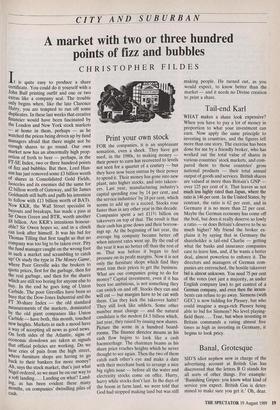Tail-end Karl
WHAT makes a share look expensive? When you have to pay a lot of money in proportion to what your investment can earn. Now apply the same principle to investing in countries, and the figures tell more than one story. The exercise has been done for me by a friendly broker, who has worked out the total value of shares in various countries' stock markets, and com- pared them to those countries' gross national products — their total annual output of goods and services. British shares are valued at more than Britain's GNP over 125 per cent of it. That leaves us not much less highly rated than Japan, where the ratio is 146 per cent. In the United States, by contrast, the ratio is 62 per cent, and in Germany it is no more than 22 per cent. Maybe the German economy has come off the boil, but does it really deserve so lowly a ratio — or does Britain's deserve to be so much higher? My friend the broker ex- plains it by saying that in Germany the shareholder is tail-end Charlie — getting what the banks and insurance companies care to leave him, and, if he wants a better deal, almost powerless to enforce it. The directors and managers of German com- panies are entrenched, the hostile takeover bid is almost unknown. You need 75 per cent of the votes (not just a majority, as under English company law) to get control of a German company, and even then the incum- bents can refuse to go away. Siemens (with GEC) is now bidding for Plessey, but who could imagine a mega-rich Plessey being able to bid for Siemens? No level playing- field there.... True, but when investing in Britain commands a rating almost five times as high as investing in Germany, it begins to look pricy.


















































 Previous page
Previous page